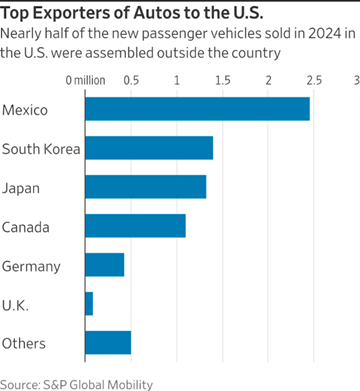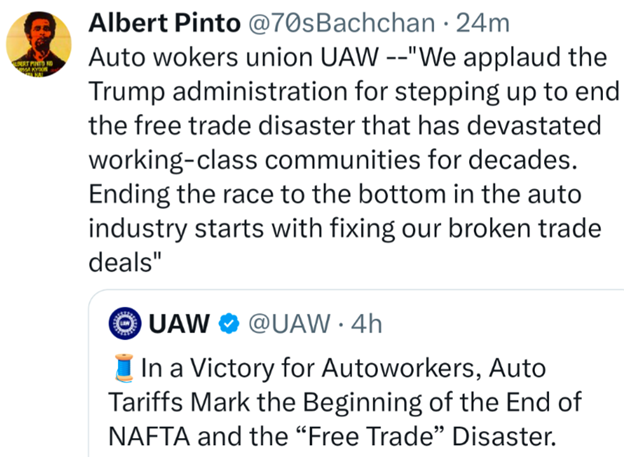President Donald J. Trump surprised the world again Wednesday with new tariffs on automobiles and auto parts. This appears to be in addition to tariffs announced previously and shocked automakers like GM and Ford who make a significant number of vehicles in Mexico and Canada.
Is Trump determined to push the U.S. into a recession?
Trump said, in all caps, “FOR YEARS WE HAVE BEEN RIPPED OFF BY VIRTUALLY EVERY COUNTRY IN THE WORLD…BUT THOSE DAYS ARE OVER.”
During the media conference after the announcement, he was asked if these new tariffs are subject to modification. Trump insisted that these auto tariffs are going to stay for the full four years of his term. “This is permanent,” he said.
Canada and Mexico will be hit especially hard by these duties, with Canada exporting to the U.S. about 1 million vehicles per year. Mexico will bear the largest impact as plants located there build and export almost 2.5 million vehicles for General Motors, Dodge Ram, Toyota as well as Nissan, BMW and Audi.
Auto parts are not exempt. There was mention of some adjustments for USMCA-compliant parts until a system can be put in place that tracks US content but the tariffs will apply to foreign-made parts.
Prime Minister Mark Carney and candidate for the Liberal Party in the election slated for April 28 said, “It’s clear that this is a violation and he has betrayed our trade agreement.”
For the EU these tariffs will be harmful to Mercedes, Porsche and Volkswagen, among others. The U.S. is the largest market in the world for premium vehicles, and the U.S. does not manufacture an equivalent to some high-end models.
According to S&P Global Mobility nearly half of new passenger vehicles sold in the U.S. are assembled outside of the U.S.

Both Canada and Mexico depend on the U.S. for more than 75 percent of all their exports, and both countries have an economy built on international trade. Canada makes more than 60 percent of its GDP in trade, compared to only 27 percent in the U.S. Mexico is even more dependent on trade than Canada.
There were very few winners on Wednesday but I found two. Tesla benefits as it sells only U.S.-made vehicles in the U.S., with factories in Texas, California and Nevada. But Elon Musk pointed out that even Tesla vehicles have some foreign parts that will attract tariffs.
And the UAW was pleased. But it is not clear if union workers will benefit as new plants are built in “right to work” states that block union membership. UAW membership has shrunk to 385,000 members, with half in the auto sector.

Source: X (Formerly, Twitter)
Nobody can convince President Trump to stop escalating this dangerous tariff war. The U.S. consumer will pay much higher prices for new cars. With an average new car price of US$49,000, the tariff will cost $12,500.
These policies will cause a recession, and push inflation higher in the U.S.
Apparently, President Donald Trump doesn’t care.
Hilliard MacBeth
The opinions expressed in this report are the opinions of the author and readers should not assume they reflect the opinions or recommendations of Richardson Wealth or its affiliates. Assumptions, opinions and estimates constitute the author’s judgment as of the date of this material and are subject to change without notice. We do not warrant the completeness or accuracy of this material, and it should not be relied upon as such. Before acting on any recommendation, you should consider whether it is suitable for your particular circumstances and, if necessary, seek professional advice. Past performance is not indicative of future results. The comments contained herein are general in nature and are not intended to be, nor should be construed to be, legal or tax advice to any particular individual. Accordingly, individuals should consult their own legal or tax advisors for advice with respect to the tax consequences to them, having regard to their own particular circumstances.. Richardson Wealth is a member of Canadian Investor Protection Fund. Richardson Wealth is a trademark by its respective owners used under license by Richardson Wealth.












